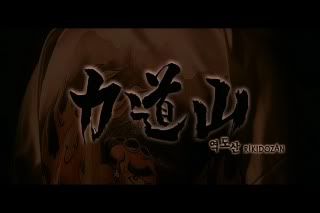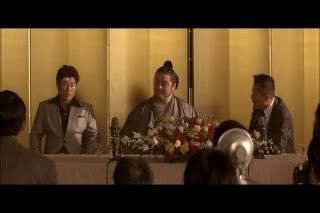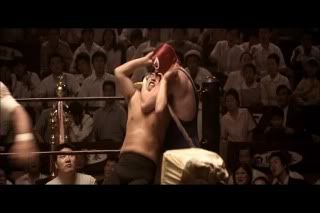
On December 15th, 1963, Rikidozan, founder of puroresu, died of peritonitis--the cause of which, or so the story goes, was a yakuza’s blade, soaked in urine. He died a rich and famous man, whose legacy still lives on.
Rikizodan’s journey to the top was an odd one: born in Korea as Kim Sin-Rak, the young Rikidozan moved to Japan (where he changed his name to Mitsuhiro Momota) to become a sumo. He left sumo in 1950; according to the film, this was due to the glass ceiling in place because of his Korean nationality, and Japanese racism. And so Rikidozan went to America, where he learned the distinctly American combat sport/performance art of pro wrestling. Riki then made a name for himself by returning to Japan, passing himself off as Japanese, and importing American-style pro wrestling to his adopted country. He struck it big by booking himself as the strong Japanese hero who could overcome all American aggression. In the years following the atomic bomb, there was something of an audience for this.

Song Hae-sung’s RIKIDOZAN: A HERO EXTRAORDINARY is a good looking film, with some decent performances, and it benefits from the profoundly interesting life it portrays. It’s not, however, a very good movie; unfortunately, it doesn’t just dip deep, deep into melodrama--it overindulges in it. It gorges on melodrama. It’s practically a fucking soap opera.
There will be some who find that fitting, for a film about a pro wrestler. Darren Aronofsky’s THE WRESTLER, however, showed how these sorts of things could be done. In RIKIDOZAN, for instance, they tip-toe around the actual legitimacy of pro wrestling--they hint that it’s not entirely on the up and up, but they’re altogether unwilling to discuss it openly, and for what it is, which hampers the storytelling.

RIKIDOZAN: A HERO EXTRAORDINARY depicts the puroresu hero (played by beefy Korean actor Sol Kung-gu) as an incredibly troubled man. At least this isn’t hagiography. Not only does the film show him as incredibly hubristic, but it paints him as an incredibly paranoid man. When a group of children, gawking at their hero from a second or third storey window, accidentally know a flower pot from the ledge, Riki construes it as an assassination attempt. More to the point, though, the film depicts Riki’s death in a way that goes totally against the standard story--but now we’re talking about the last ten minutes of the film, and I’ll have to leave that a mystery.
For those who are fans of puroresu, the principle pleasure to be derived from watching the film comes from spotting many of the wrestling stars of the time. Hey, there’s Keiji Muto (The Great Muta)! Hey, there’s Shinya Hashimoto, (rather appropriately) playing a sumo! Hey, isn’t that Masakatsu Funaki? And oh, what’s Rick Steiner doing there?
For a film about a pro wrestler, though, there certainly seems to be a dearth of actual wrestling. I think only three matches are shown, and each one is terribly truncated. Presumably, anyone watching a film about a wrestler likes wrestling, and would like to see more of it.

I could only recommend RIKIDOZAN to anyone who is already familiar with, and interested in, the wrestler himself. As a movie, it’s a bit flat, but it’s also the only film you’re going to find on the subject matter.










No comments:
Post a Comment